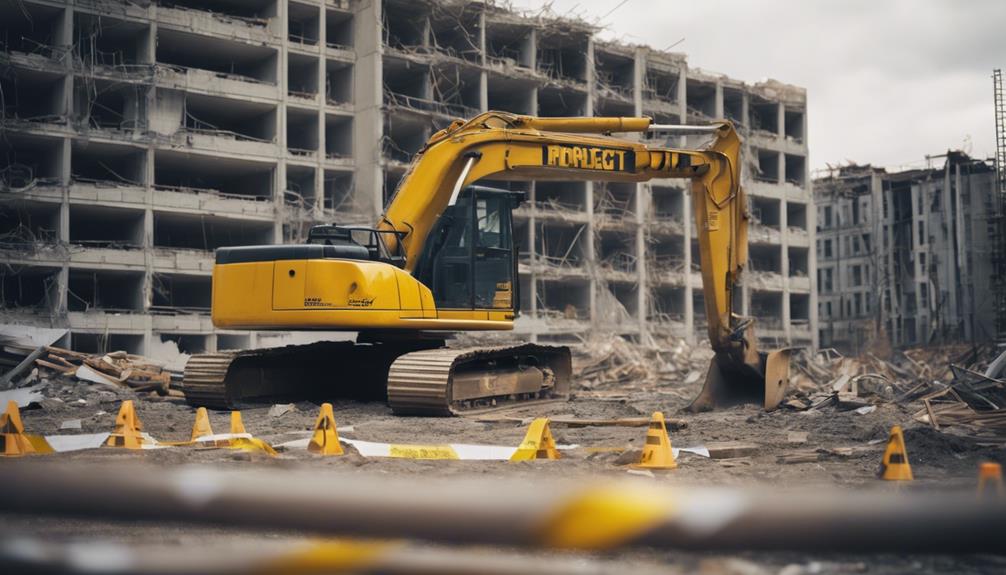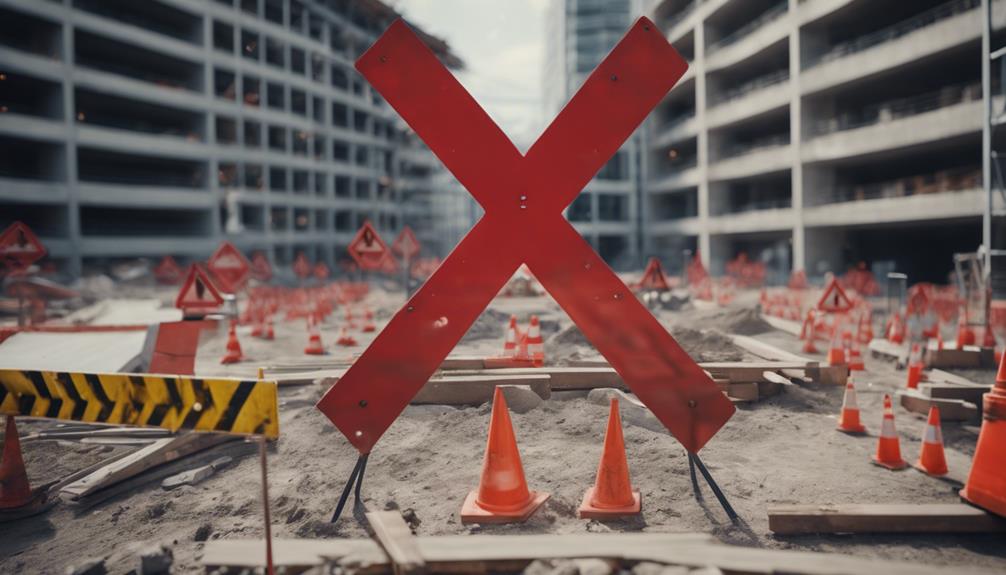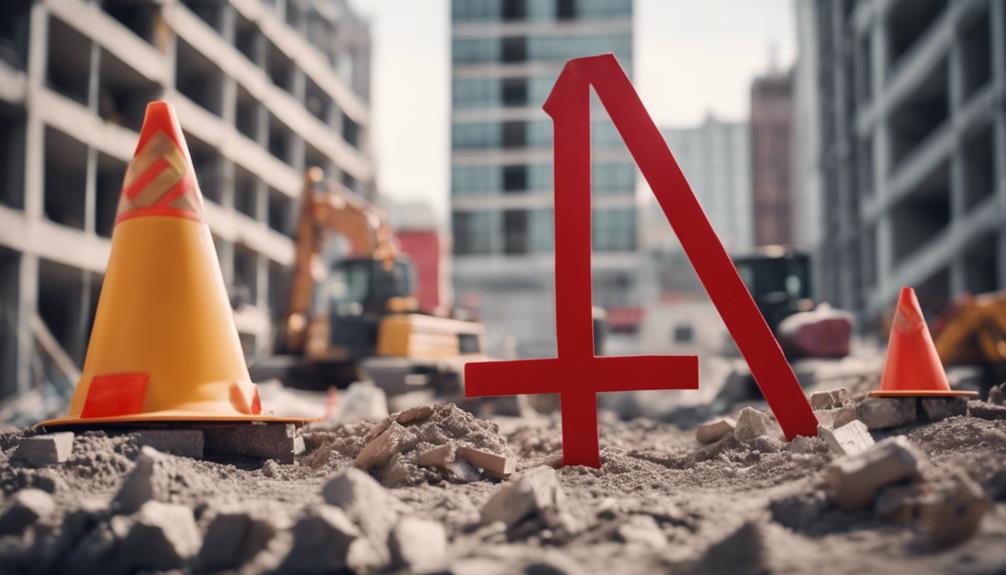When you decide to operate without a permit, you might find yourself facing serious consequences. Take, for instance, a homeowner who undertakes a major renovation without obtaining the necessary permits. While the initial motivation might be to save time or money, the aftermath can be costly.
From potential legal troubles to safety hazards and even difficulties in selling the property down the line, the implications are far-reaching. Understanding the full scope of operating unpermitted is crucial for making informed decisions and avoiding the pitfalls that come with non-compliance.
Key Takeaways
- Operating unpermitted can result in heavy fines and risk license revocation.
- Unpermitted work poses safety risks like electrical hazards and structural instability.
- Detection methods include routine checks, inspections, and fines for non-compliance.
- Seeking exemptions or creative strategies may help navigate permit requirements legally.
Legal Penalties for Operating Unpermitted
Operating without the necessary permits can expose you to significant legal penalties, including fines ranging from $1,000 to $10,000 and the risk of probation or license revocation. Violating building regulations by operating unpermitted can lead to severe consequences. These significant penalties aren't to be taken lightly as they can have lasting effects on your business and reputation.
When you operate without the required permits, you put yourself at risk of facing strict legal repercussions. Municipalities take violating building codes seriously, and the fines associated with such actions can have a substantial impact on your finances. Moreover, the potential probation or license revocation could hinder your ability to continue operating in the industry.
To avoid these severe consequences, it's crucial to ensure that you have all the necessary permits before starting any project. By following the regulations and obtaining the required permits, you can protect yourself from the legal troubles that come with operating unpermitted.
Risk of Project Demolition

Facing the risk of project demolition due to unpermitted construction can result in significant financial burdens and legal complications for property owners. When the county building department discovers unpermitted work, they may issue a demolition order, leaving you with a costly predicament. City inspectors might deem your structure unsafe, leading to mandated demolition for non-compliant projects. In such cases, professional contractors may be necessary to rectify the issues, adding to the already mounting expenses. The costs involved in fines, permits, and contractor services can quickly escalate, putting a strain on your finances.
To visualize the consequences of project demolition, consider the following table:
| Consequences of Project Demolition | ||
|---|---|---|
| Financial Burdens | Legal Complications | Safety Concerns |
| Increased Costs | Professional Contractor Fees | Property Devaluation |
| Time Delays | Emotional Stress | Rebuilding Expenses |
Impact on Homeowners Insurance
Did you know that operating without permits can jeopardize your homeowners insurance coverage? Unauthorized projects can lead to policy cancellation risks and leave you liable for damages.
It's crucial to consider the impact on your insurance benefits before undertaking any unpermitted renovations.
Insurance Coverage Implications
Unpermitted renovations can significantly jeopardize your homeowners insurance coverage, potentially leaving you financially exposed in case of damages related to unauthorized projects.
- Voided Coverage: Insurance may not cover damages caused by unpermitted work.
- Risk of Policy Cancellation: Homeowners face potential policy cancellation and repair costs.
- Challenges in Insurance Claims: Unpermitted projects can complicate claims and securing new coverage.
Make sure your home projects are permitted to avoid risking your insurance benefits and liability coverage. Stay protected by ensuring all work is authorized to prevent unexpected financial burdens.
Policy Cancellation Risks
To safeguard your homeowners insurance coverage and financial security, understanding the risks of policy cancellation due to unauthorized renovations is crucial. Engaging in unpermitted work can lead to the voiding of your home insurance policy, leaving you exposed to significant liabilities in case of damages. Insurance companies may cancel your policy upon discovering unauthorized projects, making it challenging to secure new coverage.
Moreover, the impact of unpermitted renovations on your insurance benefits and liability coverage can result in substantial financial burdens. Remember, insurers share information on unauthorized work, affecting your coverage and ability to make future claims. Therefore, obtaining proper permits for any home improvement projects is essential to avoid jeopardizing your insurance coverage.
Liability for Damages
Ensure your home insurance coverage remains intact by understanding the implications of unpermitted renovations on liability for damages. Operating without a permit can void home insurance coverage, leaving you liable for any damages related to unpermitted work. This can result in out-of-pocket repair costs, potential policy cancellations, and even mortgage complications.
Unpermitted projects may lead to lenders demanding repayment or halting the sale process, causing further financial strain. Additionally, lack of proper permits can create insurance issues, affecting coverage for future claims. It's crucial to disclose any unpermitted work to secure loan approval and ensure a successful home sale.
Safety Concerns Without Permits

Building without permits poses significant safety risks, including electrical hazards and structural instability. Non-compliance with building codes due to lack of permits can jeopardize the safety of occupants and neighboring properties.
Unpermitted construction may lack proper inspections, heightening the risk of structural failures or fires.
Safety Risks Unpermitted Operations
Operating without the necessary permits poses significant safety risks, including potential hazards such as faulty electrical wiring, unstable structures, and inadequate fire protection measures.
- Faulty electrical wiring
- Unstable structures
- Inadequate fire protection measures
These safety risks can lead to accidents, injuries, and property damage, as there's no oversight to ensure compliance with safety codes. Without proper inspections, occupants are at risk of exposure to dangerous conditions and materials, jeopardizing their well-being.
Furthermore, unpermitted operations may compromise the structural integrity of the building, endangering everyone within. By obtaining the required permits for your home improvement projects, you can ensure that safety standards are met, reducing the likelihood of facing legal liabilities and penalties.
Legal Penalties for Noncompliance
To avoid substantial fines and potential structural risks, it's crucial to adhere to permit requirements when undertaking any construction or renovation projects. Operating without the necessary building permits can result in severe legal penalties. Cities like California, Texas, and Oregon impose hefty fines, such as up to $5,000 per violation, triple permit fees plus $500, and fines up to $2,000 per violation per day, respectively.
Additionally, unpermitted work can lead to safety concerns for occupants and the community, as noncompliance with building codes may pose risks. City inspectors have the authority to declare structures unsafe, potentially resulting in demolition orders.
Ensure you comply with permit regulations to avoid these consequences and protect your investment and homeowners insurance coverage.
Implications for Future Property Sales

When considering the implications for future property sales, it's crucial to understand how unpermitted work can significantly impact the transaction process. Here are some key points to consider:
- Decreased Property Value: Failure to adhere to local building codes and obtain necessary permits can lead to a decrease in the property's overall value. Prospective buyers may view unpermitted work as a red flag, affecting their willingness to pay the desired price.
- Insurance Challenges: Insurance companies may be hesitant to provide coverage for properties with unpermitted work. This reluctance can pose a significant obstacle for potential buyers seeking financing, as insurance is a crucial component of most lending agreements.
- Legal Issues: Failing to disclose unpermitted renovations can result in legal complications during the sale process. It's essential to address these issues proactively to prevent any potential legal disputes that could delay or derail the sale.
Detection by Local Government

Local government officials use various methods to detect unpermitted construction activities, such as site inspections, neighbor complaints, and advanced technologies like aerial imagery. If your project is identified as unpermitted, you may face fines and legal consequences, including stop-work orders.
It's crucial to adhere to building regulations to avoid the repercussions of non-compliance with local government requirements.
Government Inspections for Detection
Wonder how local government inspections play a crucial role in uncovering unauthorized construction projects violating building codes? These inspections are vital in maintaining the safety and integrity of neighborhoods. Here's why they're essential:
- Routine Checks: Inspectors conduct regular inspections in neighborhoods to identify any signs of unpermitted construction.
- Violation Identification: Inspections help authorities detect unauthorized work that violates building codes, ensuring compliance with regulations.
- Common Detection Method: Local government agencies rely on inspections to identify and address unpermitted projects efficiently.
Fines for Non-Compliance
To ensure compliance with building codes and avoid substantial financial penalties, it's imperative to adhere to local government regulations regarding unpermitted construction projects. Local governments have the authority to impose fines for non-compliance, with amounts varying from hundreds to thousands of dollars.
For instance, in California, fines for unpermitted work can reach up to $5,000 per violation, while in Texas, violators might face triple permit fees along with a $500 penalty. Oregon also enforces strict penalties, with fines of up to $2,000 per violation per day for unpermitted construction projects.
Detection of unpermitted work by local government authorities can lead to heavy financial penalties and legal consequences. Therefore, it's crucial to obtain the necessary permits to avoid these costly fines and legal actions.
Legal Action Consequences
Upon detection of unpermitted operations by the government, legal consequences and penalties can swiftly follow, necessitating prompt action to rectify the situation. It's crucial to understand the potential ramifications of operating without the necessary permits.
When local government officials uncover unpermitted activities, the following outcomes may occur:
- Fines ranging from hundreds to thousands of dollars could be imposed.
- Non-compliance with operation permits might trigger inspections and enforcement actions.
- Local municipalities possess the authority to shut down unpermitted operations until the proper permits are obtained.
Strategies to Avoid Permit Requirements

When looking to sidestep permit requirements for your construction project, consider implementing strategic approaches that focus on cosmetic renovations and portable structures. By keeping renovations cosmetic and not altering the structure's footprint, you may avoid the need for a permit.
Portable structures like sheds or tiny homes can also be utilized in certain areas without requiring permits. Another tactic is to use pre-fabricated or modular additions temporarily to bypass permit requirements. Off-grid or temporary structures mightn't fall under traditional permit regulations, providing another avenue to explore.
Seeking advice from local authorities or hiring a professional can help you navigate creative solutions that may not necessitate standard permits. By being mindful of these strategies and thinking outside the box, you can potentially avoid the complexities and delays associated with permit requirements while still achieving your construction goals.
Exemptions From Permitting Requirements

Understanding the exemptions from permitting requirements can empower homeowners to proceed with certain projects without the hassle of obtaining a permit. When it comes to local regulations, some minor repairs or renovations may be exempt from permitting requirements, like painting, flooring, or minor plumbing fixes. These exemptions can vary based on location and the type of project, with some jurisdictions allowing small projects to move forward without a permit.
Typically, exempted projects involve cosmetic changes that don't impact the property's structure or safety. It's crucial to verify specific exemptions with the local building department before starting any work to avoid potential legal consequences.
Importance of Proper Site Plans

To ensure smooth project approval and compliance with regulations, precise site plans play a crucial role in accurately detailing construction layouts and property features. When applying for a building permit, having detailed site plans is essential for demonstrating compliance with local regulations and zoning requirements. These plans show property boundaries, existing structures, utilities, and landscaping features, providing a comprehensive overview of the proposed project. By including dimensions, setbacks, and other necessary details, site plans help in avoiding potential conflicts with neighboring properties and environmental concerns.
Moreover, having accurate site plans can expedite the permitting process, reducing delays in project commencement. Proper site plans aren't only a requirement for obtaining the required permits but also serve as a roadmap for successful project execution. Ensure your project's success by investing time and effort in creating precise site plans that meet the necessary criteria for the permitting process.
Obtaining Necessary Building Permits

Proper site plans pave the way for a successful project, but now, to avoid costly consequences, you must secure the necessary building permits. Remember, obtaining permits isn't just a formality; it's crucial for ensuring the safety and legality of your construction project.
Here are some key reasons why obtaining necessary building permits is essential:
- Compliance: Building permits ensure that your project complies with safety codes and regulations set by the authorities.
- Financial Protection: Failure to obtain permits can lead to hefty fines, voiding of home insurance for damages caused by unpermitted work, and even orders for demolition by the building department if the construction is deemed unsafe.
- Property Value: Retroactively obtaining permits for unpermitted projects is vital for maintaining your property's value and ensuring compliance with regulations.
Conclusion
In conclusion, operating without a permit is like building a house on a shaky foundation – it may seem stable at first, but it's only a matter of time before it all comes crashing down. Avoid the risks of legal penalties, safety concerns, and future property issues by always obtaining the necessary permits for your projects.
Remember, a solid foundation built on proper permits is the key to a successful and secure future.